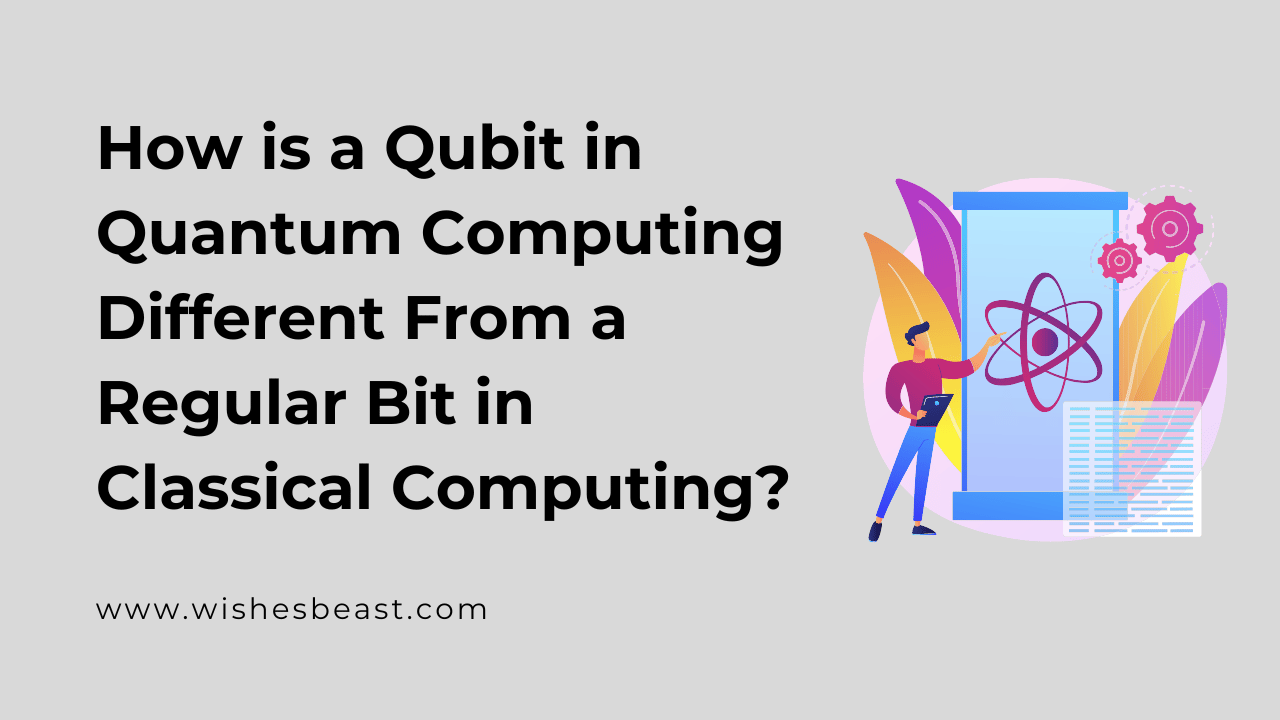Quantum computing is a realm that promises vast possibilities. At the core of this domain lies the qubit, the quantum counterpart to the classical bit. But how do they truly differ, and why does it matter?
Our comprehensive exploration of ‘How is a Qubit in Quantum Computing Different From a Regular Bit in Classical Computing?’ – a topic that holds great significance in today’s world. Join us as we delve deep into its various aspects and shed light on its importance. Let’s get started!
What is the Difference Between Qubits and Classical Bits?
Classical Computing Fundamentals
In the world of traditional computing, the classical bit is king. It’s the smallest piece of information, living as a 0 or 1. These bits operate on Boolean logic in classical computing, forming the backbone for every operation in your laptop or phone.
Quantum Computing Basics
Enter the qubit, the powerhouse behind quantum computing. Unlike classical bits restricted to 0s and 1s, qubits can be 0, 1, or both simultaneously. This magic is due to the property of superposition in qubits.
Explain the Concept of Superposition in Qubits
In the quantum realm, superposition allows a qubit to exist in a combination of 0 and 1 states. Picture a spinning coin, where you can’t definitively say if it’s heads or tails until it lands. That’s superposition! It provides the foundation for quantum parallelism – where quantum computers process multiple possibilities at once, enabling superior computational power.
What Are the Properties of Qubits in Quantum Computing?
Beyond superposition, qubits harness the mysterious concept of quantum entanglement. When two qubits become entangled, the state of one immediately impacts the other, irrespective of distance. This opens doors for new computing paradigms and challenges our understanding of the universe.
How Are Classical Bits Used in Traditional Computers?
Binary System in Classical Computing
Traditional computers utilize transistors to process bits. These transistors in classical computers act like switches, representing either a 0 or 1, forming the binary system that powers digital devices.
Can You Clarify Quantum Entanglement and Its Relation to Qubits?
Entanglement, often dubbed “spooky action at a distance” by Einstein, is a core feature of qubits. When qubits become entangled, changes to one immediately change the other, enabling faster and more complex operations. This connection lays the foundation for quantum gates and operations.
Why Are Qubits Considered More Powerful than Classical Bits?
Qubits hold unparalleled potential, chiefly due to superposition and entanglement. This allows quantum computers to perform calculations at exponential speeds compared to their classical counterparts. With qubits, problems considered unsolvable before come within reach.
Describe the Role of Binary System in Classical Computing
In traditional computing, everything boils down to the binary language of 0s and 1s. It’s a system, while powerful, that pales in potential compared to the quantum universe.
What is the Significance of Quantum Gates in Manipulating Qubits?
Quantum gates, analogous to classical gates, are tools for manipulating qubits. They allow quantum algorithms to harness qubits’ properties, leading to faster, more efficient computing.
How Does Information Storage Differ Between Qubits and Classical Bits?
Classical bits store information as either 0 or 1. Qubits, however, thanks to superposition, can represent and store information in a much more complex manner, maximizing computing potential.
Are Qubits Affected by Decoherence, and if So, How?
Indeed, qubits face challenges like quantum decoherence, where external disturbances affect their quantum state. However, with quantum error correction methods, scientists aim to stabilize qubits, making quantum computing more viable and practical.
What Advantages Does Quantum Computing Offer Over Classical Computing?
Quantum computers, powered by qubits, promise solutions to problems previously deemed insurmountable, from intricate simulations to optimization issues. As we edge closer to quantum supremacy, where quantum computers outshine classical ones, the future looks dazzlingly quantum!
Classical vs Quantum Algorithms
Understanding the power of quantum computing lies not just in the hardware but also in the software. Algorithms form the brain behind any computing system.
Classical Algorithms
Traditional computing systems rely on logical sequences, processing inputs into outputs. The speed and efficiency of these algorithms depend on classical bits and transistors in classical computers. A prevalent classical algorithm might be the binary search, which efficiently finds an item from a sorted list.
Quantum Algorithms
Quantum algorithms, on the other hand, tap into the potential of qubits to solve problems that classical algorithms might find time-consuming or even impossible. One standout example is Shor’s algorithm. While classical computers would take billions of years to factor large numbers, a quantum computer using Shor’s algorithm can do this in mere seconds, potentially rendering current encryption techniques obsolete.
Real-World Implications of Quantum Computing’s Capabilities
Imagine a world where medicines are designed based on a person’s unique genetic makeup, or traffic flows seamlessly in cities without congestion. These visions can turn into reality with quantum computing.
Healthcare: Quantum computers can analyze vast amounts of genetic data quickly, leading to personalized medicine and quicker drug discovery.
Logistics: Optimizing delivery routes or managing global supply chains could become instantaneous, saving time and resources.
Artificial Intelligence: Quantum algorithms can speed up machine learning processes, leading to smarter AI.
Encryption: While quantum computers could potentially break current encryption methods, they also promise unbreakable quantum encryption, ushering in a new age of cyber-security.
Transistors in Classical Computers vs Qubits
In classical computing, transistors act as the workhorses. These semiconductor devices switch electronic signals on or off, translating to binary 0s and 1s. As technology has advanced, these transistors have shrunk, packing billions onto a single chip.
In the quantum realm, qubits don’t rely on the same on-off mechanism. Instead, due to superposition, a qubit could be in both on and off states simultaneously, allowing for more complex information processing. Moreover, the quantum entanglement feature means interconnected qubits can communicate in ways classical bits can’t, paving the way for more efficient algorithms.
Challenges and the Way Forward
Like any burgeoning technology, quantum computing isn’t without challenges.
Decoherence and Stability: The delicate nature of quantum states means they can be easily disturbed by external factors. Achieving stable qubit operations is crucial.
Error Correction: Quantum error correction methods are being developed to address inaccuracies during quantum computations. These methods are pivotal in ensuring reliable outcomes.
Hardware Development: Building scalable and reliable quantum computers is still in its infancy. Rigorous research is ongoing to make commercial quantum computers a reality.
However, with persistent efforts from researchers worldwide and the promise of transformative change, the journey ahead for quantum computing is electrifying!
Frequently Asked Questions
How do Quantum Error Correction Methods Contribute to Stable Qubit Operations?
Quantum error correction techniques work to rectify any issues arising due to decoherence, ensuring the accurate functioning of qubits.
What are the Implications of Achieving Quantum Supremacy in Computing?
Achieving quantum supremacy means that for specific tasks, quantum computers will surpass the best classical computers, heralding a new era of technological advancement.
Contrast Digital Information with Quantum Information?
Digital information is binary, relying on 0s and 1s. Quantum information, carried by qubits, can represent more complex states, thanks to superposition and entanglement.
Provide Examples of Algorithms that Showcase the Power of Qubits Over Classical Bits?
Grover’s and Shor’s algorithms are prime examples, allowing quantum computers to solve problems much faster than classical ones.
How Close are We to Achieving Practical Quantum Computing?
While research labs and companies have developed small-scale quantum computers, we’re still a few years away from large-scale, practical quantum machines. However, rapid advancements are being made every year.
How will Quantum Computing Impact Everyday Devices like Phones and Laptops?
Initially, quantum computing will complement classical computing, especially for specific complex tasks. While quantum phones or laptops aren’t on the immediate horizon, cloud-based quantum computing services could enhance device capabilities.
Also Read: Which Part of the Drug Discovery Life Cycle Can Quantum Computing Impact the Most?
The Quantum Verdict:
We stand on the brink of a quantum revolution. As we delve deeper into the entangled world of qubits and quantum algorithms, there’s anticipation and exhilaration. The next computing era beckons, and it’s quantum-charged!
Concluding our analysis of “How is a Qubit in Quantum Computing Different From a Regular Bit in Classical Computing?” we hope that this article has acted as a definitive resource, providing you with clarity and enabling you to make well-informed choices.

